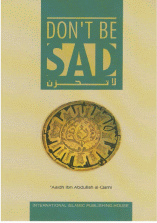Don't be Sad

Such is the Seizure of your Lord
(Such is the Seizure of your Lord when He seizes the [population of] towns while they are doing wrong.) (Qur'an 11: 102)
One can become sad and wretched for different reasons; the following are some of them: to do wrong to others, to usurp their rights, and to hurt the meek among mankind. Some of the wise used to say,
"Fear the one who finds no helper against you (in your wrongdoing) except Allah."
The history of nations has left us with poignant examples of what lies in store for the oppressor. There was the case of 'Aamir ibn at-Tufayl, who plotted to assassinate the Prophet (bpuh), who in turn supplicated against him. Forthwith, A'amir became afflicted with an enlarged gland, and after an hour of screaming and writhing from pain, he died a most painful death.
Arbad ibn Qays was wretched enough to have similar plans, and the Prophet (bpuh) supplicated against him as well. Allah sent lightning down on Arbad, scorching both him and his mount.
Shortly before Al-Hajjaj executed Sa'eed ibn Jubayr (may Allah be pleased with him). The latter supplicated and said, "O' Allah, do not empower him over anybody after me". Al-Hajjaj became afflicted with an abscess in his hand, which then quickly spread throughout his body. He experienced so much pain that he began to moan and moo like a cow, until finally, he died in a pitiable state.
Sufyan ath-Thawri was in hiding for a period of time because of threats from Abu Ja'far al-Mansoor. Abu .Ia'far was heading for the Ka'bah in Makkah while Sufyan was already within the precincts of the Ka'bah. He clung to the curtain of the edifice and prayed to Allah fervidly not to allow Abu Ja'far to enter His house. Abu Ja'far died just before reaching the outer limits of Makkah.
Ahmad ibn Abi Du'aad al-Qadi al-Mu'tazili took part in inflicting harm upon Imam Ahmad ibn Hanbal. Imam Ahmad prayed against him, and so Allah punished Ibn Abi Du'aad by making him paralyzed on one side of his body. He was heard to have said afterwards,
"As for half of my body, if a fly were to land on any part of it, I would feel that the Day of Judgment had commenced. As for the other half, if it were to be cut up into pieces by a pair of scissors, l would not feel anything."
Imam Ahmad, who was greatly wronged and harmed for a period of time, also prayed upon another of his transgressors, آ°Ali ibn Zayyat. Only a short period of time passed before someone tortured and killed lbn Zayyat by putting him into an oven and hammering nails into his head.
During the reign of Jamal 'Abdul Nasir, Hamza al-Basyounee tortured many Muslims in prison. He wickedly scoffed, "Where is your Lord so that I can put him in steel?" Far above Allah is from what the oppressors say! A truck smashed into Hamza's car killing him, and appropriately, the truck was transporting rods of steel. One rod of steel entered his body from the top of his head until it made its way down to his bowels. The rescue team was unable to extract him from the car except in pieces.
(And he and his hosts were arrogant in the land, without right, ---- and they thought that they would never return to Us.) (Qur'an 28: 39)
(And they said: 'Who is mightier than us in strength?' See they not that Allah, Who created them, was mightier in strength than them.) (Qur'an 41: 15)
Similar is the case of Salah Nasr, who was a general of 'Abdul Naasir and who was known for perpetrating evil and oppression throughout the land. He became sick with ten painful and chronic diseases. He lived for many years in misery and the doctors could find no cure for him. In the end, he died ignominiously as a prisoner in the very jails of those leaders whom he used to serve.
(And those who did transgress beyond bounds in the lands [in the disobedience of Allah]. And made therein much mischief So your Lord poured on them different kinds of severe torment) (Qur'an 89: 11-13)
The Prophet (Blessings and Peace be upon him) said:
"Verily, Allah prolongs the life of the oppressor until when He takes him, there is no escape."
And he (bpuh) also said:
"Beware of the supplication of the oppressed one, for verily, between it and Allah, there is no veil (or barrier)."
